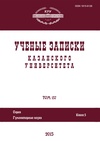Конкуренция лексем стукач и доносчик в русском языке
A Rivalry of the Nominations Stukach and Donoschik in the Russian Language
Author(s): L.V. Vladimirova, T.V. BuzanovaSubject(s): Lexis, Russian Literature, Eastern Slavic Languages
Published by: Казанский (Приволжский) федеральный университет
Keywords: snitch; informer; denunciation; rivalry of vocabulary units; national determinism of snitching; camp prose; V. Shalamov; Z. Prilepin;
Summary/Abstract: The paper considers the history of rivalry of the nominations stukach (‘snitch’) and donoschik (‘informer’) in the Russian language. The time of emerging of the noun stukach, its penetration from the prison camp slang to the spoken language, thereby entering the rivalry with the word donoschik, have been determined. The noun donoschik first appeared in the Russian language at the 18th century being stylistically neutral, and in the 19th century it changed its connotation to negative. Stukach was originally labeled negatively and appeared only in the 20th century in the bowels of the camp jargon. During the first third of the 20th century, the word stukach gradually begam to move to the spoken language and to co-exist with donoschik. Based on the analysis of the existing research concerning the topic of informing (snitching), the importance of filling the research gaps related to the lack of linguistic studies on the noun stukach has been demonstrated. Based on a material of various dictionaries and reference books, the facts that demonstrate the common and specific features in the history of these words have been revealed, the necessity of correcting of a stylistic attribution of stukach in the modern Russian language has been proved. Despite the fact that since the first third of the 20th century both words are operating in the language as synonyms, the noun stukach is marked as “colloquial” and “contemptuous” in the dictionaries and donoschik is not. In addition, the dictionaries do not provide information about the word-formation structure of stukach; they do for donoschik at full scale though. Based on the materials of “The Kolyma stories” by V. Shalamov and the novel “Obitel” (‘The Monastery’) by Z. Prilepin, the psychology of denunciation and the reasons for spread of snitching at the GULAG have been studied; the operation of these vocabulary units in a literary text have been traced; statistical data showing the number of times of the use of stukach, donoschik, and same-rooted words in these works has been presented.
Journal: Ученые записки Казанского университета. Серия Гуманитарные науки
- Issue Year: 160/2018
- Issue No: 5
- Page Range: 1163-1175
- Page Count: 13
- Language: Russian

